Values

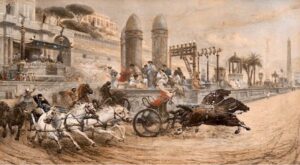 The Circus Maximus, which is Latin for largest circus is an ancient Roman chariot-racing stadium and mass entertainment venue in Rome, Italy. It is located in the valley between the Aventine and Palatine hills, and it was the first and largest stadium in ancient Rome and its later Empire. It measured 2,037 feet in length and 387 feet in width and could accommodate over 150,000 spectators. In its fully developed form, it became the model for circuses throughout the Roman Empire. The site is now a public park. In its beginning, it might have been planned for good, clean-cut entertainment, but in at least part of its history, it was used for much more sinister things. It was during the Roman Empire, when the empire decided that anyone who was not a Roman citizen was basically unimportant.
The Circus Maximus, which is Latin for largest circus is an ancient Roman chariot-racing stadium and mass entertainment venue in Rome, Italy. It is located in the valley between the Aventine and Palatine hills, and it was the first and largest stadium in ancient Rome and its later Empire. It measured 2,037 feet in length and 387 feet in width and could accommodate over 150,000 spectators. In its fully developed form, it became the model for circuses throughout the Roman Empire. The site is now a public park. In its beginning, it might have been planned for good, clean-cut entertainment, but in at least part of its history, it was used for much more sinister things. It was during the Roman Empire, when the empire decided that anyone who was not a Roman citizen was basically unimportant.
As it has been throughout history, the Roman Empire was notorious for its persecution of Christian and Jewish people. During those years, the Circus Maximus was used for the execution of Christian and Jewish prisoners, as part of the Roman Triumph, along with chariot racing, of course. As we all know, the Roman Empire worshiped a number of gods, which put them in direct conflict with the one true God, and thereby, put them at odds with the Christians and Jews. During those years, Christians were persecuted and prosecuted, throughout the Roman Empire.
Pagan practices such as making sacrifices to the deified emperors or other gods were abhorrent to Christians as their beliefs prohibited idolatry. When they would not comply with the pagan practices, they were prosecuted by the state and other members of civic society and severely punished for “treason, various rumored crimes, illegal assembly, and for introducing an alien cult that led to Roman apostasy.” The first, localized Neronian persecution occurred under Emperor Nero (BC54-BC68) in Rome. A more general persecution occurred during the reign of Marcus Aurelius (BC161-BC180). After a lull, persecution resumed under Emperors Decius (BC249–BC251) and Trebonianus Gallus (BC251–BC253). The Decian persecution was particularly extensive. The persecution of Emperor Valerian (BC253–BC260) ceased with his notable capture by the Sasanian Empire’s Shapur I (BC240–BC270) at the Battle of Edessa during the Roman–Persian Wars. His successor, Gallienus 
 (BC253–BC268), halted the persecutions. Most, if not all of these emperors were viciously wicked men, including Gallienus, who finally stopped this horrific practice. Nevertheless, he did stop it, so that is a good thing. There is a right and wrong way to put someone on trial, and most importantly, there should always be freedom of religion, but not all countries allow freedom of religion.
(BC253–BC268), halted the persecutions. Most, if not all of these emperors were viciously wicked men, including Gallienus, who finally stopped this horrific practice. Nevertheless, he did stop it, so that is a good thing. There is a right and wrong way to put someone on trial, and most importantly, there should always be freedom of religion, but not all countries allow freedom of religion.
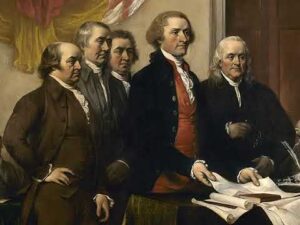
 Recently, my sisters, Cheryl Masterson, Caryl Reed, Alena Stevens, Allyn Hadlock, and I started a book club. Before each meeting, we read a book, on our own time, and then come together to discuss the book we read. We chose the Presidents of the United States as our topics, and each time we progress to the next president. We began at the beginning, President George Washington. We went on to John Adams, Thomas Jefferson, James Madison, and next will be James Monroe. One takeaway from these books has been that while our founding fathers may have had their faults, and some more than others, each tried to do what they saw as the best thing for this nation. They also knew that more than anything, we needed freedom. We could not continue to live under British rule.
Recently, my sisters, Cheryl Masterson, Caryl Reed, Alena Stevens, Allyn Hadlock, and I started a book club. Before each meeting, we read a book, on our own time, and then come together to discuss the book we read. We chose the Presidents of the United States as our topics, and each time we progress to the next president. We began at the beginning, President George Washington. We went on to John Adams, Thomas Jefferson, James Madison, and next will be James Monroe. One takeaway from these books has been that while our founding fathers may have had their faults, and some more than others, each tried to do what they saw as the best thing for this nation. They also knew that more than anything, we needed freedom. We could not continue to live under British rule.
We had to be free of England, and so it was that Independence Day, also known as the Fourth of July, is now a federal holiday in the United States commemorating that freedom, and the Declaration of Independence, which  was ratified by the Second Continental Congress on July 4, 1776, establishing the United States of America. The Declaration of Independence was largely written by Thomas Jefferson but was collectively the work of the Committee of Five, which also included John Adams, Benjamin Franklin, Roger Sherman, and Robert Livingston. The Founding Father delegates of the Second Continental Congress declared that “the Thirteen Colonies were no longer subject (and subordinate) to the monarch of Britain, King George III, and were now united, free, and independent states.” The Congress voted to approve independence by passing the Lee Resolution on July 2 and adopted the Declaration of Independence two days later, on July 4. We were a free nation, but that did not mean that Great Britain would willingly accept that. In fact, Great Britain did not accept US independence until 1783…a full seven years after it was first declared.
was ratified by the Second Continental Congress on July 4, 1776, establishing the United States of America. The Declaration of Independence was largely written by Thomas Jefferson but was collectively the work of the Committee of Five, which also included John Adams, Benjamin Franklin, Roger Sherman, and Robert Livingston. The Founding Father delegates of the Second Continental Congress declared that “the Thirteen Colonies were no longer subject (and subordinate) to the monarch of Britain, King George III, and were now united, free, and independent states.” The Congress voted to approve independence by passing the Lee Resolution on July 2 and adopted the Declaration of Independence two days later, on July 4. We were a free nation, but that did not mean that Great Britain would willingly accept that. In fact, Great Britain did not accept US independence until 1783…a full seven years after it was first declared.
Like many “start-up” countries, the United States met with heavy opposition the minute it tried to get going. The “Mother Country” didn’t want to let go. Great Britain called the United States the “Colonies” long after we 
 were actually a free nation. Even when they knew they had lost any control over the United States, they tried to get it back, and in the absence of getting their control back, they downplayed the importance of the United States. That was probably the most ridiculous part of it, because the United States became the most powerful nation in the world. While some might disagree, and while we have had our ups and downs, this nation will always stand. Today, we celebrate the nation that we love. The United States of America…the home of the free, because of the brave. Happy Independence Day to this great nation!! Let the celebration begin!!
were actually a free nation. Even when they knew they had lost any control over the United States, they tried to get it back, and in the absence of getting their control back, they downplayed the importance of the United States. That was probably the most ridiculous part of it, because the United States became the most powerful nation in the world. While some might disagree, and while we have had our ups and downs, this nation will always stand. Today, we celebrate the nation that we love. The United States of America…the home of the free, because of the brave. Happy Independence Day to this great nation!! Let the celebration begin!!
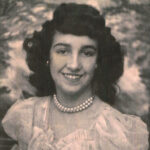
 My aunt, Virginia Beadle was the second daughter of my grandparents, Hattie and George Byer. Like her older sister, Evelyn Hushman, Aunt Virginia helped with their younger siblings. When you come from a family of nine children, there are always babies to care for. I don’t suppose the girls always loved taking care of their siblings. Younger siblings can be a trial to the older kids…especially as the older kids head into their teen years. Nevertheless, they did what was needed. Still, when Aunt Virginia found out that since her sister was the main babysitter, and she didn’t have to do housework after a late night of babysitting, Aunt Virginia, who hated housework, asked if the same rule would apply to her if she was working. When Grandma said it would, the deal was sealed. Aunt Virginia went out and got herself a job. She always had one after that, and true to her word, Grandma didn’t make her do housework. I don’t know how long that deal lasted, but for a teenager, who hated housework, it was a good deal.
My aunt, Virginia Beadle was the second daughter of my grandparents, Hattie and George Byer. Like her older sister, Evelyn Hushman, Aunt Virginia helped with their younger siblings. When you come from a family of nine children, there are always babies to care for. I don’t suppose the girls always loved taking care of their siblings. Younger siblings can be a trial to the older kids…especially as the older kids head into their teen years. Nevertheless, they did what was needed. Still, when Aunt Virginia found out that since her sister was the main babysitter, and she didn’t have to do housework after a late night of babysitting, Aunt Virginia, who hated housework, asked if the same rule would apply to her if she was working. When Grandma said it would, the deal was sealed. Aunt Virginia went out and got herself a job. She always had one after that, and true to her word, Grandma didn’t make her do housework. I don’t know how long that deal lasted, but for a teenager, who hated housework, it was a good deal.
One of the coolest events of Aunt Virginia’s life was the day happened when she was about 8 or 10 years old. 
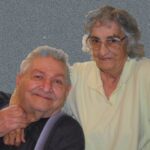 She was playing outside with her siblings. Aunt Virginia decided to go exploring at the side of the house, between their house and Great Grandma Byer’s house. She looked at the little flower garden there and saw something shiny. When she picked it up, she saw that his was a man’s wedding ring. Great Grandpa was long dead, and her dad, Grandpa George Byer, had decided to forego a wedding ring so that he could give his bride, her mom and my grandma, Hattie Byer a wedding ring. Obviously, this was an exciting, and quite likely valuable, find.
She was playing outside with her siblings. Aunt Virginia decided to go exploring at the side of the house, between their house and Great Grandma Byer’s house. She looked at the little flower garden there and saw something shiny. When she picked it up, she saw that his was a man’s wedding ring. Great Grandpa was long dead, and her dad, Grandpa George Byer, had decided to forego a wedding ring so that he could give his bride, her mom and my grandma, Hattie Byer a wedding ring. Obviously, this was an exciting, and quite likely valuable, find.
Aunt Virginia took the ring to show her dad. Grandpa looked at it and told her it was a beautiful ring. He put it on his hand and looked at it. Then he took it off and gave it back to Aunt Virginia. She said, “Daddy, you should keep it.” He said he couldn’t, but she insisted, and that is how my grandfather got his wedding band from his daughter. Aunt Virginia was so pleased to be able to give her dad the wedding ring he had never had and would 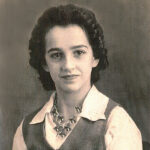
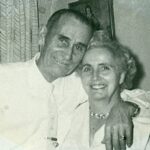 not be able to buy for himself, as there were too many other things that his paycheck was needed for. And Grandpa was so pleased that she wanted him to have such a beautiful ring. He wore the ring proudly for the rest of his life. And everyone in his family was very pleased that he had been blessed with the ring. Aunt Virginia was always a kind and loving person, and I can see how that ring made her day, as much as it did Grandpa’s. Today would have been Aunt Virginia’s 94th birthday. Happy birthday in Heaven, Aunt Virginia. We love and miss you very much!!
not be able to buy for himself, as there were too many other things that his paycheck was needed for. And Grandpa was so pleased that she wanted him to have such a beautiful ring. He wore the ring proudly for the rest of his life. And everyone in his family was very pleased that he had been blessed with the ring. Aunt Virginia was always a kind and loving person, and I can see how that ring made her day, as much as it did Grandpa’s. Today would have been Aunt Virginia’s 94th birthday. Happy birthday in Heaven, Aunt Virginia. We love and miss you very much!!
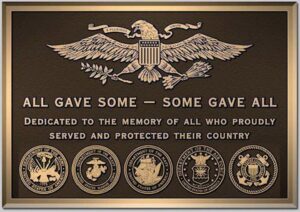
 Memorial Day is a different kind of day, because it is not a holiday of celebration, but rather a day remembrance. We cannot celebrate this day, because it is about honoring those soldiers who went to war and didn’t make it back. It was the ultimate sacrifice. As the saying goes concerning soldiers, “all gave some, but some gave all!” When a soldier goes to war, they know. They are very aware that the possibility exists that they will not come back home. They know that their sacrifice might be the ultimate sacrifice. They want to make it home, but they know it may not be. Today is about those soldiers who did not make it home.
Memorial Day is a different kind of day, because it is not a holiday of celebration, but rather a day remembrance. We cannot celebrate this day, because it is about honoring those soldiers who went to war and didn’t make it back. It was the ultimate sacrifice. As the saying goes concerning soldiers, “all gave some, but some gave all!” When a soldier goes to war, they know. They are very aware that the possibility exists that they will not come back home. They know that their sacrifice might be the ultimate sacrifice. They want to make it home, but they know it may not be. Today is about those soldiers who did not make it home. 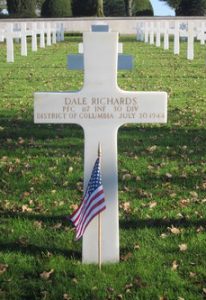
I doubt if there are many families that can say that they have never lost a soldier in battle, but while I don’t specifically know of any in my family, I’m sure there are some back there a way. There have been many wars, and with each one examined, comes the increased chance of having a relative who dies at war. It doesn’t matter anyway, because Memorial Day is a day to honor those who gave all, whether they are related to us or not. Their sacrifice is what makes us free today. They fought for people they didn’t even know, gave up time with the family they loved, and died in a place they didn’t want to be. That is the epitome of bravery and courage.
Some of them, including my uncle, Jim Richards’ brother Dale Richards never left the place they died. Dale fought in Normandy, France, and that is where he is to this day. The people of France are so grateful for the soldiers who fought and died over there, that they keep the graves looking beautiful. It’s nice to know that there are people who continue to show their appreciation for those men who “gave all” for them. Their sacrifice should never be forgotten. Their families can certainly never forget. They have had to go forward with their lives without the love and support of the soldier that went to war and never came home. That soldier had 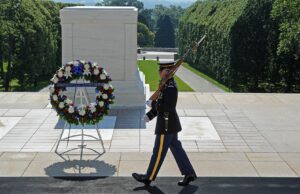
 potential. They could have been anything they wanted to be, but instead, they chose to give their life to ensure the freedom of other human beings. Today, we honor all of those men who “gave all” for us and so many others. We thank you for your service, and we honor your memory. God bless you all, from a grateful nation.
potential. They could have been anything they wanted to be, but instead, they chose to give their life to ensure the freedom of other human beings. Today, we honor all of those men who “gave all” for us and so many others. We thank you for your service, and we honor your memory. God bless you all, from a grateful nation.
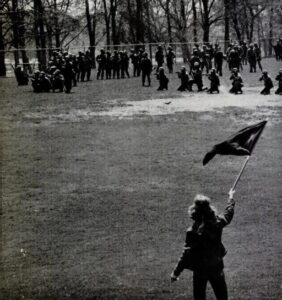 The Vietnam War was a volatile time in American history. When the war started, so did the draft. Many people protested, especially students. I suppose for them, it all felt so much closer to home, than for the older Americans. Still, the students were not alone in protesting. Many Americans agreed and protested too. The law allows for “peaceful” protesting, saying that it is “a constitutionally protected form of expression under the First Amendment in the United States. It falls under the right to free assembly, allowing every American to voice their opinions and advocate for change. However, a protest becomes a riot when one or more people within the group engage in criminal activity. This can include intentionally damaging property or causing physical harm to another person1. In other words, when a peaceful demonstration loses control and turns violent, it transitions from a protest to a riot.”
The Vietnam War was a volatile time in American history. When the war started, so did the draft. Many people protested, especially students. I suppose for them, it all felt so much closer to home, than for the older Americans. Still, the students were not alone in protesting. Many Americans agreed and protested too. The law allows for “peaceful” protesting, saying that it is “a constitutionally protected form of expression under the First Amendment in the United States. It falls under the right to free assembly, allowing every American to voice their opinions and advocate for change. However, a protest becomes a riot when one or more people within the group engage in criminal activity. This can include intentionally damaging property or causing physical harm to another person1. In other words, when a peaceful demonstration loses control and turns violent, it transitions from a protest to a riot.”
On May 2, 1970, a protest rally at Kent State University resulted in the National Guard troops being called out to suppress students who were now rioting in protest of the Vietnam War and the US invasion of Cambodia. As scattered protests continued the next day, they were dispersed by tear gas, and on May 4th class resumed at Kent State University. University officials put a ban of rallies, but it didn’t stop the rallies. By noon, some 2,000 people had assembled on the campus. The National Guard troops arrived and ordered the crowd to disperse, fired tear gas, and advanced against the students with bayonets fixed on their rifles. As is common among protesters, some refused to disperse, and even responded by throwing rocks and verbally taunting the troops.
As the situation escalated, and without firing a warning shot, 28 Guardsmen discharged more than 60 rounds  toward a group of demonstrators in a nearby parking lot, killing four and wounding nine, one of whom would be permanently paralyzed. The closest casualty was 20 yards away, and the farthest was almost 250 yards away. After a period of disbelief, shock, and attempts at first aid, angry students gathered on a nearby slope and were again ordered to move by the Guardsmen. Though they were prepared to stand and even die for their beliefs, faculty members were able to convince the group to disperse, and further bloodshed was prevented. The Kent State campus was closed for six weeks following the tragedy.
toward a group of demonstrators in a nearby parking lot, killing four and wounding nine, one of whom would be permanently paralyzed. The closest casualty was 20 yards away, and the farthest was almost 250 yards away. After a period of disbelief, shock, and attempts at first aid, angry students gathered on a nearby slope and were again ordered to move by the Guardsmen. Though they were prepared to stand and even die for their beliefs, faculty members were able to convince the group to disperse, and further bloodshed was prevented. The Kent State campus was closed for six weeks following the tragedy.
News of the shootings reverberated across the globe. It also led to protests on college campuses across the country. Just five days after the shootings, 100,000 people demonstrated in Washington, DC, both against the war and the killing of unarmed student protesters. The media put out photographs of the massacre, and the images became enduring images of the anti-war movement. A criminal investigation followed, and in 1974, at the end of the investigation, a federal court dropped all charges levied against eight Ohio National Guardsmen for their role in the Kent State students’ deaths. The decision was followed by outrage.
After the decision was made, the defendants issued a statement, “In retrospect, the tragedy of May 4, 1970, should not have occurred. The students may have believed that they were right in continuing their mass protest in response to the Cambodian invasion, even though this protest followed the posting and reading by the university of an order to ban rallies and an order to disperse. These orders have since been determined by the Sixth Circuit Court of Appeals to have been lawful.
Some of the Guardsmen on Blanket Hill, fearful and anxious from prior events, may have believed in their own 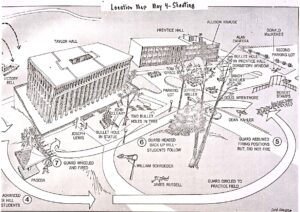 minds that their lives were in danger. Hindsight suggests that another method would have resolved the confrontation. Better ways must be found to deal with such a confrontation.
minds that their lives were in danger. Hindsight suggests that another method would have resolved the confrontation. Better ways must be found to deal with such a confrontation.
We devoutly wish that a means had been found to avoid the May 4th events culminating in the Guard shootings and the irreversible deaths and injuries. We deeply regret those events and are profoundly saddened by the deaths of four students and the wounding of nine others which resulted. We hope that the agreement to end the litigation will help to assuage the tragic memories regarding that sad day.” I agree, better ways must be found by both the protesters and the authorities.
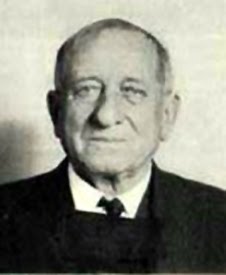
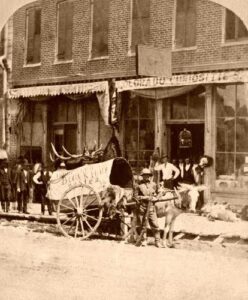 Louis H Blonger was born in Swanton, Vermont, on May 13, 1849. He was the eighth of 13 children. His father, Simon Peter Belonger, was a stonemason born in Canada of French ancestry. His mother, Judith Kennedy, was raised in an orphanage in Nenagh, County Tipperary, Ireland. The Belonger family migrated from Vermont to the lead mining village of Shullsburg, Wisconsin, when Lou was five years old. Sadly, his mother died in 1859, and Lou was sent to live with his older sister and her husband for a few years. It was around that time, that Blonger began using a shortened version of the family name (omitting the first “e”), as most of his brothers did.
Louis H Blonger was born in Swanton, Vermont, on May 13, 1849. He was the eighth of 13 children. His father, Simon Peter Belonger, was a stonemason born in Canada of French ancestry. His mother, Judith Kennedy, was raised in an orphanage in Nenagh, County Tipperary, Ireland. The Belonger family migrated from Vermont to the lead mining village of Shullsburg, Wisconsin, when Lou was five years old. Sadly, his mother died in 1859, and Lou was sent to live with his older sister and her husband for a few years. It was around that time, that Blonger began using a shortened version of the family name (omitting the first “e”), as most of his brothers did.
The Civil War broke out when Lou was just 15 years old. While he was technically just a boy, Lou enlisted in the Union Army anyway. While he was a soldier, someone must have known that he was quite young, and he soon found himself playing a musical instrument called a fife, helping to keep the marching pace of the soldiers. A Fifer was a common job for those boys who were too young to fight. When the war ended, Lou joined up with his older brother, Sam. The boys headed west hoping to make their fortunes in the many Colorado, Utah, and Nevada mining camps. As they were about to find out, mining isn’t the easiest way to make “your fortune” and so they found themselves moving from camp to camp, taking various jobs working in saloons and mines while doing a little prospecting, plenty of gambling, and practicing several con games in cities across the West, from Deadwood, South Dakota, to Silver City, New Mexico, and on to San Francisco, California. For a short time, Lou and Sam even served as lawmen in Albuquerque, New Mexico, where they were said to have provided protection for Doc Holliday and Wyatt Earp.
The brothers could be found in Denver, Colorado by the 1880s, where they ran a saloon on Larimer Street and later on Stout Street. Within ten years, they had become wealthy from their investments in mining claims, as well as their profits from their popular Denver saloons. Their saloons catered to gamblers and provided “painted ladies” for their customers, but it was far more due to their various games of fraud and graft practiced on many 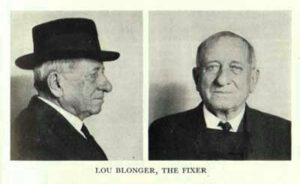 a hapless miner, that brought in the most money for the pair. While in Denver, they practiced their cons widely, in open competition with the well-known Soapy Smith Gang. Eventually, the Blonger brothers took over control as the “Kingpins” of the Denver underworld, when Soapy Smith moved on in 1896. They consolidated the city’s competing gangs of confidence men into a single organization.
a hapless miner, that brought in the most money for the pair. While in Denver, they practiced their cons widely, in open competition with the well-known Soapy Smith Gang. Eventually, the Blonger brothers took over control as the “Kingpins” of the Denver underworld, when Soapy Smith moved on in 1896. They consolidated the city’s competing gangs of confidence men into a single organization.
Operating their “business” as a “big store” con, or fake betting house, central facilities were established, complete with betting windows, chalkboards for race results, and ticker-tape machines. Here, the gang members would convince unsuspecting customers to put up large sums of cash to secure the delivery of promised stock profits or winning bets on horse races. It was this practice that is portrayed in the movie, The Sting. Lou also had several men working for him who profited as pickpockets, shell-game experts, and other small-time con games. Lou’s operation was so tight that no one could operate in the city without gaining his permission and “donating” a share of their proceeds to him. Not satisfied with their original influence, they began to wield their power by influencing elections and political appointments to protect their racket and shield their gang members from prosecution.
Blonger added a second-in-command, named Adolph W “Kid” Duff in 1904. Duff was an experienced hand, having long been a member of several other Colorado gangs and well known as a gambler, opium dealer, and pickpocket. With this addition, the profits of the “organization” increased, and by 1920, Lou Blonger had grown so powerful that many said he “owned” the city of Denver. He was said to be able to fix any arrest with a phone call and was making thousands of illegal dollars a year in his extensive confidence games. Lou even had a private telephone line in his office that ran directly to the chief of police…who was also corrupt. Lou had become known as “The Fixer” and had become one of the leaders of the longest-running confidence rings in the American West. Nevertheless, even this was a doomed enterprise.
Blonger had been a decent young man turned successful criminal for decades, when in 1922, it all ended. Di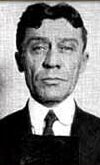
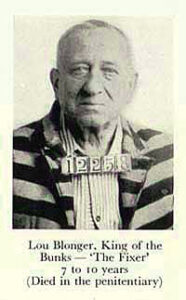 strict Attorney Philip S Van Cise circumvented the corrupt Denver politicians and established his own “secret force” of local citizens. They were funded by private donations, an Van Cise’s men were able to arrest 33 confidence men, including Louis Blonger and “Kid” Duff. The trial was big news and highly publicized. The people were tired of the corruption, and upon their conviction, Louis Blonger and many other gang members were sentenced to prison in Cañon City, Colorado. Lou Blonger and “Kid”, Duff received sentences of seven to ten years, nevertheless, Blonger would again escape hi “due punishment” when just five months after going to prison, he died on April 20, 1924, at the age of 74. Duff, in the meantime, was out on bond pending another court case, when he committed suicide. You might be wondering what Lou’s older brother Sam was doing at this time. Sam had died some ten years earlier.
strict Attorney Philip S Van Cise circumvented the corrupt Denver politicians and established his own “secret force” of local citizens. They were funded by private donations, an Van Cise’s men were able to arrest 33 confidence men, including Louis Blonger and “Kid” Duff. The trial was big news and highly publicized. The people were tired of the corruption, and upon their conviction, Louis Blonger and many other gang members were sentenced to prison in Cañon City, Colorado. Lou Blonger and “Kid”, Duff received sentences of seven to ten years, nevertheless, Blonger would again escape hi “due punishment” when just five months after going to prison, he died on April 20, 1924, at the age of 74. Duff, in the meantime, was out on bond pending another court case, when he committed suicide. You might be wondering what Lou’s older brother Sam was doing at this time. Sam had died some ten years earlier.

 Many advancements have been made in our world through the studies of science. Still, sometimes, scientists take their study of science just a little bit too far, in the name of science. There isn’t a person in the world who hasn’t heard of Albert Einstein. He was not only the iconic, but common to geniuses, Einstein was also eccentric. Nevertheless, he was a brilliant scientist, mathematician, and one of the most intelligent people in history. Because of his brilliance, Einstein also knew that upon his death, there would undoubtedly be some crazy scientist who would want to study his brain. I can’t imagine knowing that my brain would be in demand, and in fact might be stolen after I had died. That seems totally insane to me, but for Einstein, it was a very real possibility. Knowing that, Einstein left detailed instructions to cremate his body and not to allow any brain examinations.
Many advancements have been made in our world through the studies of science. Still, sometimes, scientists take their study of science just a little bit too far, in the name of science. There isn’t a person in the world who hasn’t heard of Albert Einstein. He was not only the iconic, but common to geniuses, Einstein was also eccentric. Nevertheless, he was a brilliant scientist, mathematician, and one of the most intelligent people in history. Because of his brilliance, Einstein also knew that upon his death, there would undoubtedly be some crazy scientist who would want to study his brain. I can’t imagine knowing that my brain would be in demand, and in fact might be stolen after I had died. That seems totally insane to me, but for Einstein, it was a very real possibility. Knowing that, Einstein left detailed instructions to cremate his body and not to allow any brain examinations.
As sometimes happens, even when a detailed and legal will is written, there are those who do not necessarily think that it needs to be followed. I think that is just heinous!! When Einstein died in 1955, a scientist named Thomas Stoltz Harvey conducted the autopsy. This man completely disregarded the will that was written by Albert Einstein, and despite the family not granting permission, he stole Einstein’s brain and took it to the University of Philadelphia to study it. When they found out about the theft, Einstein’s family decided to give  permission to Harvey to go ahead and study Einstein’s brain, as long as he published the finding in a scientific magazine. At that point they had few other options. Still, I believe it was a criminal act, and Harvey should have been punished to the fullest extent of the law.
permission to Harvey to go ahead and study Einstein’s brain, as long as he published the finding in a scientific magazine. At that point they had few other options. Still, I believe it was a criminal act, and Harvey should have been punished to the fullest extent of the law.
After, Harvey stole Einstein’s brain, “it was preserved, photographed, dissected, and even mailed to other scientists in hopes that studying it might uncover the source of his genius. Over decades, several interesting features of his brain have been discovered, including more extensive connections between the two hemispheres of his brain, a lighter than average weight, and an enlarged lateral sulcus. The part of his brain dedicated to mathematical and spatial thought, the inferior parietal lobe, was larger than average as well.” These days, you can view his brain (now with permission from his family)…or what is left of it after the mutilation it was subjected to, in the permanent exhibitions of the Mütter Museum in Philadelphia, Pennsylvania.
I don’t think “in the name of science” should be a license to steal something that belongs to someone else. Their body parts, whether needed for a transplant or for scientific study, should not be allowed. If a person wanted their body donated for science or transplant, they would have stated as much. I understand a family allowing a transplant if no specific instructions were given, but when specific instructions were given, as in the case of Albert Einstein, how dare someone decide that their desires are more important than the desires of the 
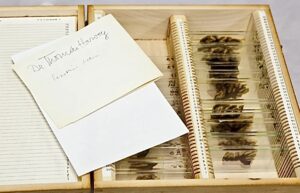 deceased!! Once the damage was done, and the brain was stolen, Einstein’s family made the decision not to prosecute, but rather to allow the scientific testing. It was a gracious move on their part, and an act of mercy that was most certainly not earned by one Thomas Stoltz Harvey!! I also speculate that it could have opened the door for additional victims…allowed in the name of science. This was just wrong…in so many ways!!
deceased!! Once the damage was done, and the brain was stolen, Einstein’s family made the decision not to prosecute, but rather to allow the scientific testing. It was a gracious move on their part, and an act of mercy that was most certainly not earned by one Thomas Stoltz Harvey!! I also speculate that it could have opened the door for additional victims…allowed in the name of science. This was just wrong…in so many ways!!
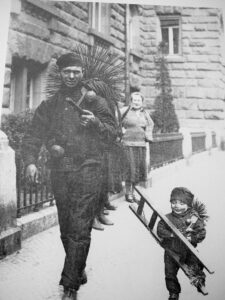
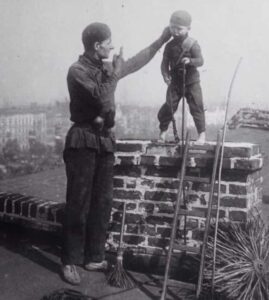 Perhaps one of the most questionable of all professions undertaken by children in the past was that of chimney sweeping. Not only were children exploited in this job, mostly because of their small stature, but since proper safety measures were not taken in those days, the children in those jobs had health problems for the rest of their lives, and very likely they died young. The use of children as chimney sweeps began in the late 1600s in England, after the Great Fire of London, which gutted the city. At that time, building codes changed, requiring chimneys to be much narrower than they were previously. The idea was to keep more of the sparks in than out.
Perhaps one of the most questionable of all professions undertaken by children in the past was that of chimney sweeping. Not only were children exploited in this job, mostly because of their small stature, but since proper safety measures were not taken in those days, the children in those jobs had health problems for the rest of their lives, and very likely they died young. The use of children as chimney sweeps began in the late 1600s in England, after the Great Fire of London, which gutted the city. At that time, building codes changed, requiring chimneys to be much narrower than they were previously. The idea was to keep more of the sparks in than out.
The new design brought with it a bigger problem…keeping the chimneys free of obstruction, which became more of a challenge and a priority. Amazingly, instead of someone inventing a tool for this purpose, children were employed as human chimney sweeps. Their small stature allowed them to go inside the chimneys and manually sweep away the soot. Thus practice went on for over 200 years, in spite of the deplorable conditions the children lived in, the horrible health effects they suffered, and the many injuries and fatalities resulting from related work hazards.
One former chimney sweep, James Seaward was interviewed in December 1909, by the Toronto Saturday Night, a Canadian publication. Seaward was living in Wokingham, where he had just been named alderman of the town’s Borough Council. Seaward was one of the fortunate few that were still alive after working as a chimney sweep for 58 years. He started when he was just six. Seaward tells how he “was only six years old when I went up my first chimney. I was an orphan and I fell into the hands of a chimney sweep, and a cruel master he was. I have known what it was to have straw lighted under me and pins stuck into the soles of my feet to force me up a chimney; and I have known, too, what it was to come down covered with blood and soot after climbing with my knees and elbows. No one knows the terrible cruelty inflicted on boys in those days. 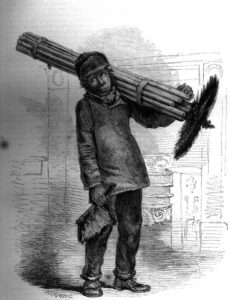
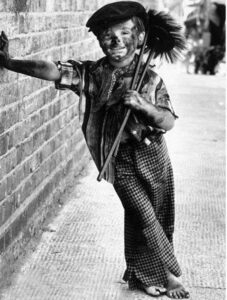 They used to be steeped in strong brine to harden their flesh. In my own case soda was used. Sometimes I used to have to stay up a difficult chimney five or six hours at a stretch.”
They used to be steeped in strong brine to harden their flesh. In my own case soda was used. Sometimes I used to have to stay up a difficult chimney five or six hours at a stretch.”
Somehow, Seaward managed to survive, and to actually prosper, even is such deplorable conditions. Thankfully, such cruelty was outlawed during the nineteenth century, with laws introduced regarding child labor. Those laws didn’t address chimney sweeps specifically, but rather child labor in general. The things that were allowed in the past concerning child labor were just awful, and orphans were specifically targeted, because they had little protections over their lives. They were often “adopted” out, but their “new parents” sometimes just wanted slave labor.

 When the FBI began to suspect that they had a mole in the mid-1980s, they assigned the investigation to FBI Agent Robert Philip Hanssen. Hanssen was born April 18, 1944, in Chicago, Illinois, to a Lutheran family that lived in the Norwood Park neighborhood. He was of Norwegian descent. His father, Howard, who died 1993, was a Chicago police officer, and was allegedly emotionally abusive to Hanssen during his childhood. Nevertheless, Hanssen went on to graduate from William Howard Taft High School in 1962 and attended Knox College in Galesburg, Illinois. He graduated with a bachelor’s degree in chemistry in 1966. Hanssen joined the FBI in 1976. Things were going well for him in the FBI, but then, something changed.
When the FBI began to suspect that they had a mole in the mid-1980s, they assigned the investigation to FBI Agent Robert Philip Hanssen. Hanssen was born April 18, 1944, in Chicago, Illinois, to a Lutheran family that lived in the Norwood Park neighborhood. He was of Norwegian descent. His father, Howard, who died 1993, was a Chicago police officer, and was allegedly emotionally abusive to Hanssen during his childhood. Nevertheless, Hanssen went on to graduate from William Howard Taft High School in 1962 and attended Knox College in Galesburg, Illinois. He graduated with a bachelor’s degree in chemistry in 1966. Hanssen joined the FBI in 1976. Things were going well for him in the FBI, but then, something changed.
In 1979, just three years after joining the FBI, Hanssen approached the Soviet Main Intelligence Directorate (GRU) to offer his services. It is thought that he may have had some financial difficulties, and this meeting became the beginning of his first espionage cycle, lasting until 1981. After that, he laid low for a while. Then, in 1981, he restarted his espionage activities and continued until 1991. After that, he ended communications during the collapse of the Soviet Union, because he was afraid that he would be exposed. Hanssen restarted communications the next year and continued until his arrest. Throughout his spying, he remained anonymous to the Russians.
Hanssen spied for Soviet and Russian intelligence services against the United States from 1979 to 2001. His espionage was described by the Department of Justice as “possibly the worst intelligence disaster in US history.” In all, he sold about six thousand classified documents to the KGB that detailed US strategies in the event of nuclear war, developments in military weapons technologies, and aspects of the US counterintelligence program. Hanssen was involved in espionage at the same time as Aldrich Ames in the Central Intelligence Agency (CIA). Both Ames and Hanssen compromised the names of KGB agents working secretly for the United States. Some of those KGB agents were executed for their betrayal. Hanssen also revealed a multimillion-dollar eavesdropping tunnel built by the FBI under the Soviet Embassy. Then in 1994, Ames was arrested. At that time, some of these intelligence breaches remained unsolved, so the search began for another spy. Ironically, they chose the spy himself to search for the spy. How convenient it was for Hanssen. Finally, the FBI paid $7 million to a KGB agent to obtain a file on an anonymous mole. That information led to Janssen’s exposure, when he was identified through fingerprint and voice analysis.
On February 18, 2001, Hanssen was arrested at Foxstone Park, near his home in the Washington DC, suburb of 
 Vienna, Virginia, after leaving a package of classified materials at a dead drop site. Following his arrest, he was charged with selling US intelligence documents to the Soviet Union and subsequently Russia for more than $1.4 million in cash, diamonds, and Rolex watches over a period of twenty-two years. Hanssen pleaded guilty to fourteen counts of espionage and one of conspiracy to commit espionage, to avoid the death penalty. He was sentenced to fifteen life terms without the possibility of parole and was incarcerated at ADX Florence until his death on June 5, 2023.
Vienna, Virginia, after leaving a package of classified materials at a dead drop site. Following his arrest, he was charged with selling US intelligence documents to the Soviet Union and subsequently Russia for more than $1.4 million in cash, diamonds, and Rolex watches over a period of twenty-two years. Hanssen pleaded guilty to fourteen counts of espionage and one of conspiracy to commit espionage, to avoid the death penalty. He was sentenced to fifteen life terms without the possibility of parole and was incarcerated at ADX Florence until his death on June 5, 2023.

 In the days, and even months, leading up to Christmas, most people are trying to get ahead of the game by shopping for gifts for family and friends, and then squirreling them away to await the big day of reveal. We all hope we have found that perfect gift for our loved ones…that gift that tells them how much we love them. Some people are very crafty (a skill I have mastered…a few times, but not too many). Those who are crafty find themselves able to give that unique gift that comes from both the heart and the hand. Still, every gift sent from the heart is loved and is a blessing.
In the days, and even months, leading up to Christmas, most people are trying to get ahead of the game by shopping for gifts for family and friends, and then squirreling them away to await the big day of reveal. We all hope we have found that perfect gift for our loved ones…that gift that tells them how much we love them. Some people are very crafty (a skill I have mastered…a few times, but not too many). Those who are crafty find themselves able to give that unique gift that comes from both the heart and the hand. Still, every gift sent from the heart is loved and is a blessing.
While the gifts are a blessing and something we want to give, they are, nevertheless, a big job, that grows bigger as our families grow. Still, would we want our families not to grow. Of course not!! Each new person is a blessing, and each is very loved. Still for those of us doing the Christmas shopping, trying to get ideas without giving ourselves away, and trying to keep those gifts hidden, it is not a project without a little bit of stress…especially as Christmas draws nearer and nearer. Oh, and don’t forget the monumental job of wrapping all those gifts. I was commenting to my daughter, Amy Royce, that wrapping was something I was going to have to “make myself” do, and she told me to wrap them as I get them!! Oh, to be so organized, hahahaha!!!
Most of us put up our Christmas decorations shortly after Thanksgiving, but there are those who can’t wait that 
 long. They might put their decorations up right after Halloween. I don’t think I would go that far, but it doesn’t really matter, either way, decorating is a big job…even for those who love it. Some people have kids to help, or grandkids who come and help. That makes it easier, but others do their own decorations. No matter how you decorate, most of us are just happy to have the decorating done…while trying not to think about the work ahead of us when it’s time to take it all down again.
long. They might put their decorations up right after Halloween. I don’t think I would go that far, but it doesn’t really matter, either way, decorating is a big job…even for those who love it. Some people have kids to help, or grandkids who come and help. That makes it easier, but others do their own decorations. No matter how you decorate, most of us are just happy to have the decorating done…while trying not to think about the work ahead of us when it’s time to take it all down again.
Now, we have arrived at the big day…whether you open gifts on Christmas Eve, or Christmas Day, or a combination of both. We hope our gifts are well received, loved, and not duplicated. Even if they are duplicated, it’s not the worst thing to happen. They can be exchanged, so all is well. Everything that has to do with Christmas has been done…or has it. So often, the real reason for the season…the birth of Jesus, is all but forgotten. How sad that is!! We focus more on Christmas movies, shopping, Santa Clause, and the Grinch, than we do on Jesus. There is nothing wrong with those other things, but we really need to know that the true reason for the season (whether Jesus was born in December or some other time of year) is to remember that God looked down on this messed up world and saw the family that He loved. He knew that we were lost, and 
 without a Savior, doomed to Hell. That’s when He devised a plan to save us. He sent His Son, Jesus to be born a baby, grow to manhood, and then die on the cross as a sinless sacrifice for us!! We weren’t worthy, but like any Father, who loves his children, God chose to buy us back, and Jesus was the payment!! How can we possibly go through this season without remembering the birth and sacrifice of our blessed Savior. Remember the reason for the season!! Merry Christmas everyone!!
without a Savior, doomed to Hell. That’s when He devised a plan to save us. He sent His Son, Jesus to be born a baby, grow to manhood, and then die on the cross as a sinless sacrifice for us!! We weren’t worthy, but like any Father, who loves his children, God chose to buy us back, and Jesus was the payment!! How can we possibly go through this season without remembering the birth and sacrifice of our blessed Savior. Remember the reason for the season!! Merry Christmas everyone!!

